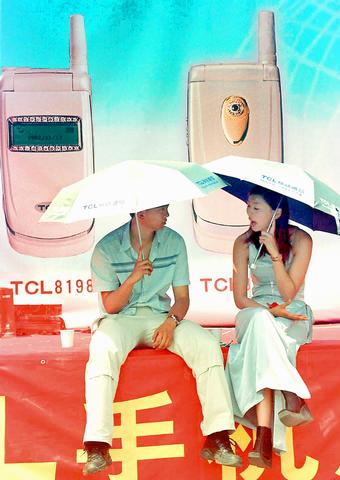Taiwan's Hsinchu Science-based Industrial Park will expand by 29.2 hectares, thanks to land acquired from the Ministry of National Defense, officials said yesterday.
The new space at the crowded, 605-hectare industrial park will make room for two additional 12-inch chip fabs and an IC design center.
DRAM makers Macronix International Co (

PHOTO: AFP
The land, formerly the Du-hsing military base (
At a ceremony yesterday, President Chen Shui-bian (
New facilities on the land are expected to be completed by 2005.
The president said a partnership between the public and private sector made the project possible. Chen also praised the defense ministry, which agreed to relocate the army base to make room for the high-tech firms.
Because of rapid growth and high concentration of tech companies, the Hsinchu Science-based Industrial Park is known as Taiwan's Silicon Valley.
The park is home to 312 technology firms, including the nation's two biggest chipmakers, Taiwan Semiconductor Manufacturing Co (
But a shortage of space at the park has forced companies to look to places such as Singapore to set up new chip fabs.
After an environmental impact assessment was completed and the 29.2 hectares rezoned for industrial use, the project was able to move ahead yesterday.
Officials say a sewage treatment plant will also be built on the property to treat waste water generated from the firms.
Yesterday's ground-breaking ceremony was hosted by Wei Che-ho (
"We hope to complete construction by the end of 2005," Wei said.
Hsinchu County Commissioner Cheng Yung-chin (
Earlier this month, officials from the National Science Council said that a fault line running through the property shouldn't be a problem. Under the property's environmental impact assessment, buildings will be required to be 50m from each other.
Tougher building codes have also been adopted.
According to geologists from National Taiwan University, who inspected the fault line, the area has been inactive for roughly more 30,000 years, although that doesn't preclude the possibility of future seismic activity.

Application-specific integrated circuit designer Faraday Technology Corp (智原) yesterday said that although revenue this quarter would decline 30 percent from last quarter, it retained its full-year forecast of revenue growth of 100 percent. The company attributed the quarterly drop to a slowdown in customers’ production of chips using Faraday’s advanced packaging technology. The company is still confident about its revenue growth this year, given its strong “design-win” — or the projects it won to help customers design their chips, Faraday president Steve Wang (王國雍) told an online earnings conference. “The design-win this year is better than we expected. We believe we will win

Intel Corp chief executive officer Lip-Bu Tan (陳立武) is expected to meet with Taiwanese suppliers next month in conjunction with the opening of the Computex Taipei trade show, supply chain sources said on Monday. The visit, the first for Tan to Taiwan since assuming his new post last month, would be aimed at enhancing Intel’s ties with suppliers in Taiwan as he attempts to help turn around the struggling US chipmaker, the sources said. Tan is to hold a banquet to celebrate Intel’s 40-year presence in Taiwan before Computex opens on May 20 and invite dozens of Taiwanese suppliers to exchange views

Chizuko Kimura has become the first female sushi chef in the world to win a Michelin star, fulfilling a promise she made to her dying husband to continue his legacy. The 54-year-old Japanese chef regained the Michelin star her late husband, Shunei Kimura, won three years ago for their Sushi Shunei restaurant in Paris. For Shunei Kimura, the star was a dream come true. However, the joy was short-lived. He died from cancer just three months later in June 2022. He was 65. The following year, the restaurant in the heart of Montmartre lost its star rating. Chizuko Kimura insisted that the new star is still down

While China’s leaders use their economic and political might to fight US President Donald Trump’s trade war “to the end,” its army of social media soldiers are embarking on a more humorous campaign online. Trump’s tariff blitz has seen Washington and Beijing impose eye-watering duties on imports from the other, fanning a standoff between the economic superpowers that has sparked global recession fears and sent markets into a tailspin. Trump says his policy is a response to years of being “ripped off” by other countries and aims to bring manufacturing to the US, forcing companies to employ US workers. However, China’s online warriors